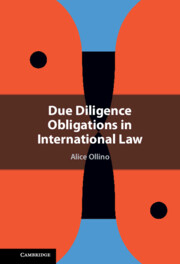Book contents
- Due Diligence Obligations in International Law
- Due Diligence Obligations in International Law
- Copyright page
- Dedication
- Contents
- Acknowledgements
- Abbreviations
- Introduction
- 1 The Foundations of Due Diligence in International Law
- 2 The Nature of Due Diligence Obligations
- 3 The Scope and Content of Due Diligence Obligations
- 4 Due Diligence Obligations in the Law of International Responsibility
- 5 The Proceduralisation of Due Diligence Obligations
- Conclusion
- Bibliography
- Index
2 - The Nature of Due Diligence Obligations
Published online by Cambridge University Press: 24 February 2022
- Due Diligence Obligations in International Law
- Due Diligence Obligations in International Law
- Copyright page
- Dedication
- Contents
- Acknowledgements
- Abbreviations
- Introduction
- 1 The Foundations of Due Diligence in International Law
- 2 The Nature of Due Diligence Obligations
- 3 The Scope and Content of Due Diligence Obligations
- 4 Due Diligence Obligations in the Law of International Responsibility
- 5 The Proceduralisation of Due Diligence Obligations
- Conclusion
- Bibliography
- Index
Summary
This chapter asks to which international obligations the concept of due diligence applies and argues that clarifying the nature of these obligations is crucial for understanding the type of conduct expected of a state and for making considerations in terms of international responsibility. In order to situate due diligence within the theory of public international law obligations, the chapter begins by critically illustrating the distinction between obligations of conduct and obligations of result and retraces the history of this taxonomy in the ILC work on state responsibility. The chapter then explores the nature of due diligence obligations, arguing that these are obligations of conduct, linked to the concept of risk and characterised by a degree of flexibility. Through a deductive approach, the chapter maps out the array of primary rules that are typically construed as due diligence duties. it is argued that these rules typically include obligations aimed at avoiding a risk from arising (obligations to prevent; obligations to protect); obligations aimed at ensuring the realisation of particular goals; and other primary rules like duties to negotiate or cooperate.
Keywords
- Type
- Chapter
- Information
- Due Diligence Obligations in International Law , pp. 64 - 130Publisher: Cambridge University PressPrint publication year: 2022

